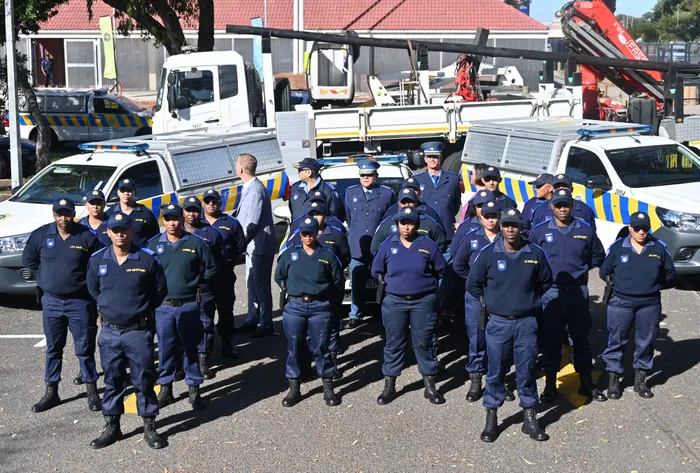SAPS complicity emboldens syndicates, derails economy

Picture: Ayanda Ndamane African News Agency (ANA) - City of Cape Town’s Energy Safety Team was established to assist Law Enforcement agencies and the South African Police Service (SAPS) in protecting critical City electricity infrastructure in the metro.
By Mary de Haas
In the run-up to the 2016 local government elections, business forums emerged in Durban’s townships.
When the new metro council took office, these forums, the most prominent of which was Delangokubona, soon made their presence felt, especially in the construction industry. Their demands for a substantial share of building and infrastructural work were accompanied by intimidation, threats, and violence.
The number of forums proliferated countrywide, forming a federation. Their impact on South Africa’s economy – estimated at R68 billion – and on legitimate business viability, was devastating.
Known as mafias for their violent extortion tactics, the term business forum is a misnomer, for they operate as criminal syndicates. That they have been permitted to continue, and expand, their unlawful activities stems from the lack of a political and criminal justice system will to stop them.
Some forums include supposed former MK operatives, a group including bone fide veterans and criminals who fled into exile in the early 1990s and returned to fuel intra-ANC violence in the townships. They have close working relationships with various municipal councils in KwaZulu-Natal, including those in the Harry Gwala District. In their eThekwini home base they are, together with dozens of councillors, the alleged beneficiaries of a corrupt R208 million refuse removal contract. In Msunduzi they are allegedly rewarded by politicians with housing projects in Wards 21 and 29. Membership of these forums, and that of taxi and housing mafias, may overlap.
In some cases, connections among forums, police members and politicians are clear. In a Midlands area, local police failed to investigate an assault case opened by an opponent of an allegedly corrupt councillor with known police links. When supporters of the councillor opened a malicious case against the abused opponent, members of the forum he worked with went to the home of the abused man to arrest him, but he was not at home (all this is on record with the police, who failed to act).
The violent tactics used by armed forum members often halt construction projects, including those linked to roads and water infrastructure, if demands are not met. Despite the construction industry having begged the state to intervene, the failure of the SAPS – constitutionally charged with preventing crime – to act against them is a common theme.
Many legitimate businesses have resorted to obtaining court interdicts, which are ignored; it is becoming increasingly common for court orders to be ignored with impunity including by the police. Businesses that can afford it, and municipalities, incur huge costs in providing security company protection for their employees (politicians may benefit from security company ownership).
Worst affected by the criminal forum activities are small businesses – the very people who should be receiving government support. Some businesses are intimidated into capitulation and doing deals with people who are, in effect, operating criminal syndicates.
To call these syndicates “business forums” is an insult to genuine small businesses that operate legally. Such businesses proliferated in the informal sector during the apartheid years, and lifted millions of people out of poverty through hard work, not through extortion. The government kowtows to the demands of these forums, but small black businesses that suffered serious losses during the 1980s and 1990s violence never received compensation.
These forums belong in the same category as taxi and housing mafias such as those that are acquiring and selling land illegally in Camperdown areas, and currently terrorising legal land owners there. In all these cases, the lack of action by the SAPS, even when court orders are obtained, is conspicuous.
That these criminal “business” syndicates have been allowed to grow exponentially in number in the past seven years through a campaign of terror – including the threat of death, and abduction of family members – is a stark symptom of the state’s complicity in South Africa’s descent into lawlessness.
Instead of rewarding them, interventions by the SAPS should have been immediate, including through the deployment of suitably equipped Public Order Policing, arrests, prosecutions, and the implementation of court orders.
This lawlessness has flourished because policing is in a state of crisis that threatens our security. Nationally, SAPS crime intelligence members have been on a go-slow because they lack vehicles to do their work – the vehicles acquired for that purpose having disappeared elsewhere. The rule of law is under attack and, unlike when that happened in the 1980s, and religious and business leaders were at the forefront of the struggle to save it, those voices are now silent.
Why is business bothering to engage with the government if it is not holding it to account for its economic losses due to escalating lawlessness, and insisting on immediate, constructive action?
*Mary de Haas is a violence monitor in KZN, an Honorary Research Fellow at the University of KZN’s School of Law and a member of the Navi Pillay Research Group on justice and human rights.